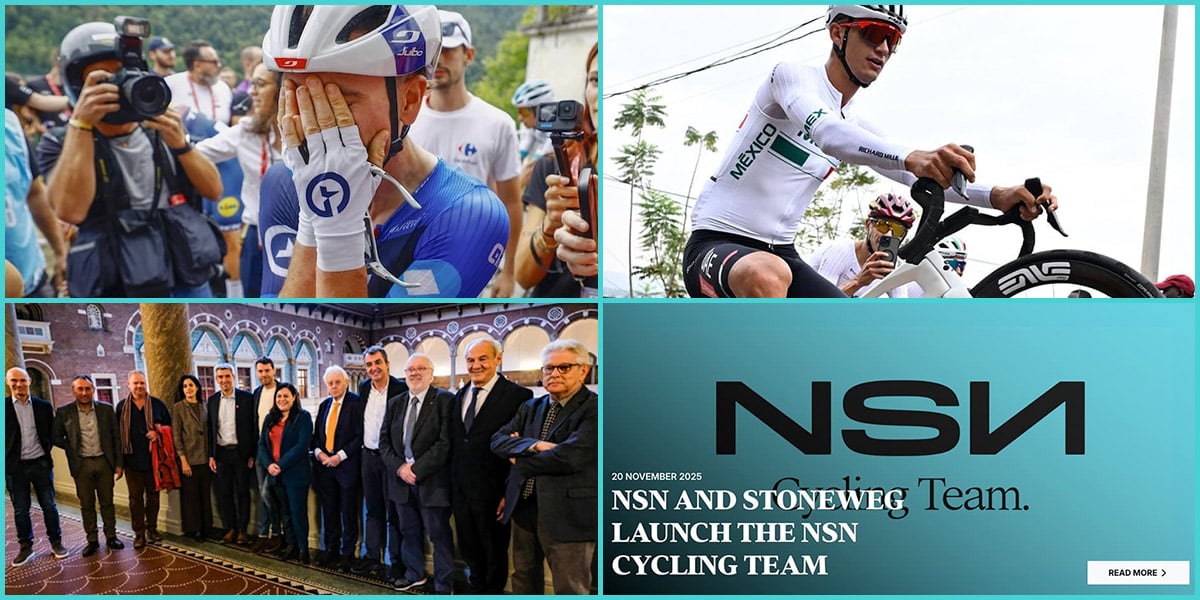In this week’s AIRmail, The Outer Line unpacks a wide-ranging set of developments across pro cycling and the broader sports landscape — from newly released financial data that sheds light on the true economic pressures inside the WorldTour, to the murky restructuring of the former Israel–Premier Tech team, to ASO’s tightening grip on race governance. We also examine which riders meaningfully shifted their trajectories in 2025 as the sport hurtles toward a fiercely competitive 2026 season, and explore whether the WNBA’s high-stakes labor showdown could reshape the balance of power in women’s sports. As always, AIRmail delivers context, clarity, and deeper insight into the forces driving modern sport.
Analysis, Insight, and Reflections from The Outer Line.
# Catch up on pro cycling – and its context within the broader world of sports – with AIRmail … Analysis, Insight and Reflections from The Outer Line. You can subscribe to AIRmail here, and check out The Outer Line’s extensive library of articles on the governance and economics of cycling here. #
Key Takeaways:
· New Financial Information For Visma-LAB
· Mystery Around (Former) Israel-Premier Tech Team
· AIOCC Elects a “New” Boss
· 2026: Who Improved and Who Didn’t
· WNBA Power Play: Will It Pay Off?
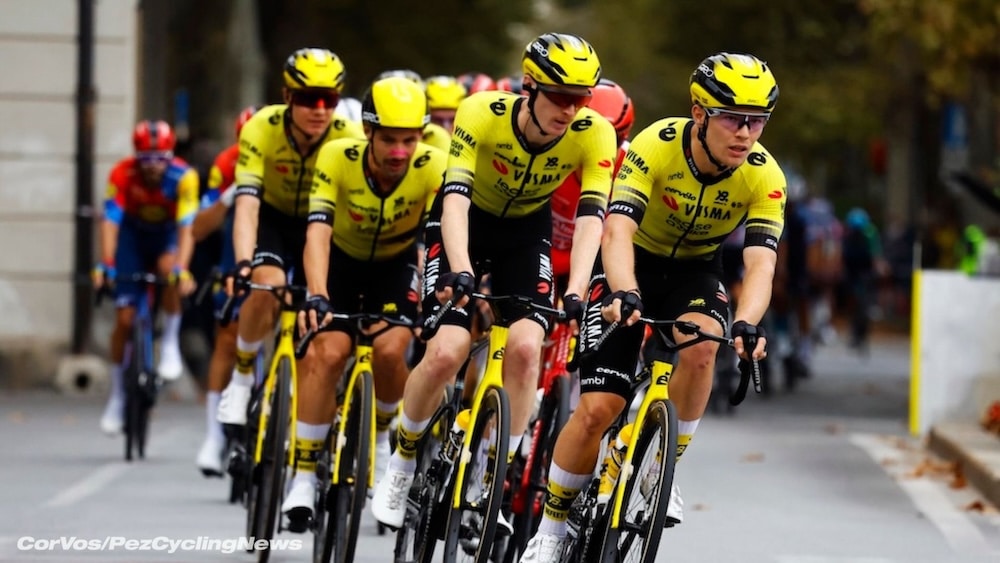
The Money in Sport Substack issued an eye-opening report last week on the Visma Lease-a-Bike team’s financial situation that also provided considerable information on the WorldTour’s economic health. The new Visma team owner is an entity called Yellow B Cycling Holding BV, which is itself co-owned by team director Richard Plugge and a Dutch billionaire named Robert van der Wallen. Plugge and his partner acquired the team in late 2023 for €8 million; the relative ownership of Yellow B Cycling was not revealed. (This is the first set of public numbers following the team’s recent separation from its sister speed-skating team.) The report indicates Visma-LAB had an operating loss of €6.1 million in 2024 on revenues of €52 million. Although not specifying the exact source for its data, the report also lists the 2024 budgets for several other WT teams, including Quick-Step at €38 million, and in descending order down through Decathlon, Groupama, Uno-X, Movistar and Cofidis to Lotto, with a budget of €17 million. Curiously, total personnel costs (riders and all staff) for the different teams are reported to range all the way from 89% at Movistar to 37% at Uno-X, while most teams are in the 60%-70% range. (We surmise there may be some measurement or definitional differences, as this seems to represent an unrealistically wide range.) Visma is reported to have far more employees than any of the other teams, and almost three times as many as Uno-X.
Most of the teams are, unsurprisingly, shown to have either a tiny loss or a tiny profit in 2024. Typically, a team will exhaust its sponsorship revenues, but will not have the financial capability to spend much more; most are, by necessity, more or less breakeven operations. However, Visma once again stands out in terms of the magnitude of its loss – which it can presumably stomach for at least one year due to the deeper pockets of its ownership. Notably, although numbers for Team UAE are not included in these comparisons, Visma management “must believe that this level of resources is what it takes to mount a credible challenge” to Tadej Pogacar and his colleagues. The report concludes – as so many past analyses have – that the “broader question for professional cycling is whether elite-level competition can ever be financially sustainable, or whether it will always require wealthy benefactors willing to subsidize losses” (our italics).
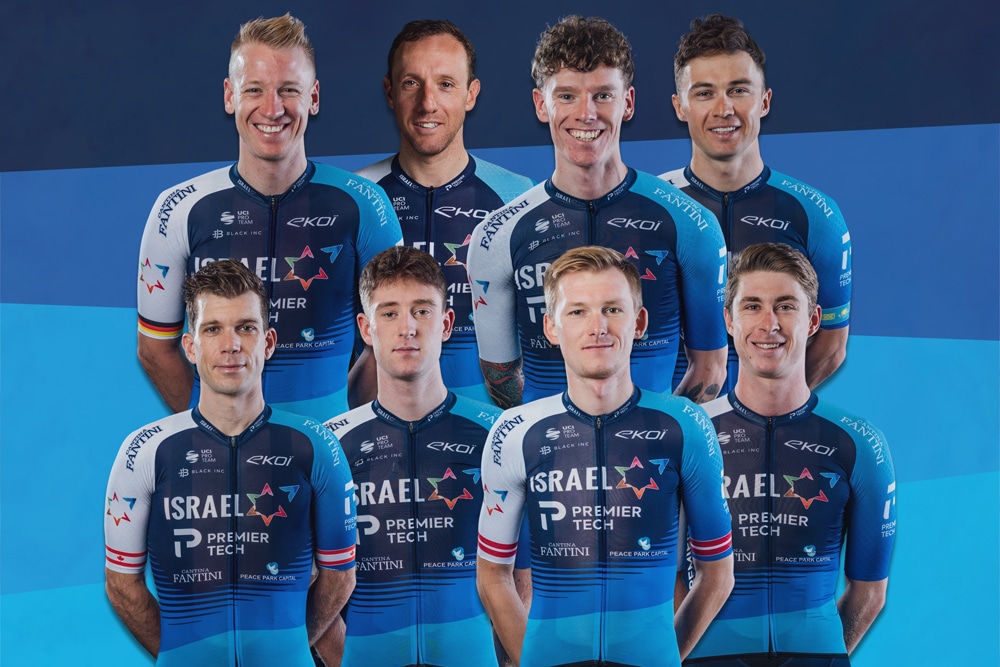
After weeks of rumors surrounding the fate of the Israel-Premier Tech team, developments this week revealed at least a partial “answer” – in the form of more questions. The team will continue in 2026, but under a new identity – the NSN Cycling Team, described as a Swiss-based operation running out of Barcelona and Girona. But almost nothing about the team’s future structure is clear beyond the name change. The joint announcement from NSN (Never Say Never) and Stoneweg, a Geneva-based investment firm, reads more like an exercise in obfuscation than a foundational relaunch. Even the most basic question – who actually owns the team now – is left conspicuously unanswered. Long-time team director Kjell Carlström, who was never a public voice of the team at I-PT, was quoted in the press release, This, and the fact that longtime owner Sylvan Adams is not mentioned anywhere, raises the possibility that Adams has either sold the team or is intentionally being written out of the narrative. (The Outer Line contacted both Carlstrom and the normally voluble Adams, but received no reply.) As Jonathan Kaplan of the Riding With newsletter asked, “What did they actually buy? The license? The assets? The contracts? Is this a takeover or just a rebranding?”
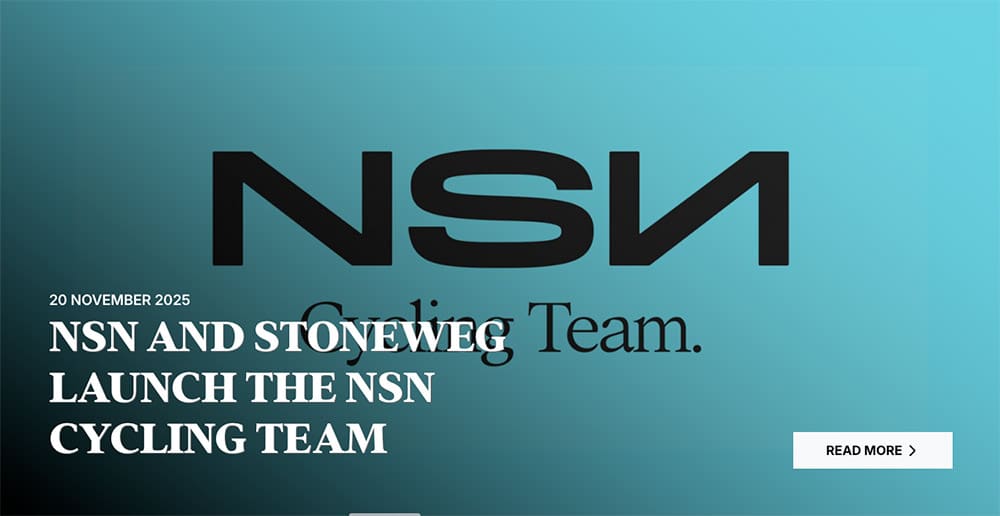
If the team has been sold and is under new ownership, one might ask why Carlström is still in charge, with the same staff, riders, and previously linked sponsors? The release claims NSN “acquired the license,” but then frames the relationship with Stoneweg as a “joint venture,” without clarifying whether Stoneweg is a co-owner, minority investor, or merely a sponsor. And one would assume that if Adams can no longer use the team to promote the country of Israel and Israeli cycling, he probably won’t be interested in continuing to fund the team; this however is not confirmed. Could any of these changes deflect the criticism and protest pressure that has been focused on the team? For example, the Gran Canaria Island Council just backed out of a €6.5 million deal to host the final four stages of the 2026 Vuelta a España due to the planned participation from the team formerly known as I-PT. Hence, it is reasonable (at least at this stage) to ask: will the asset that NSN and Stoneweg somehow just acquired gain enough goodwill to race the biggest events on the calendar?
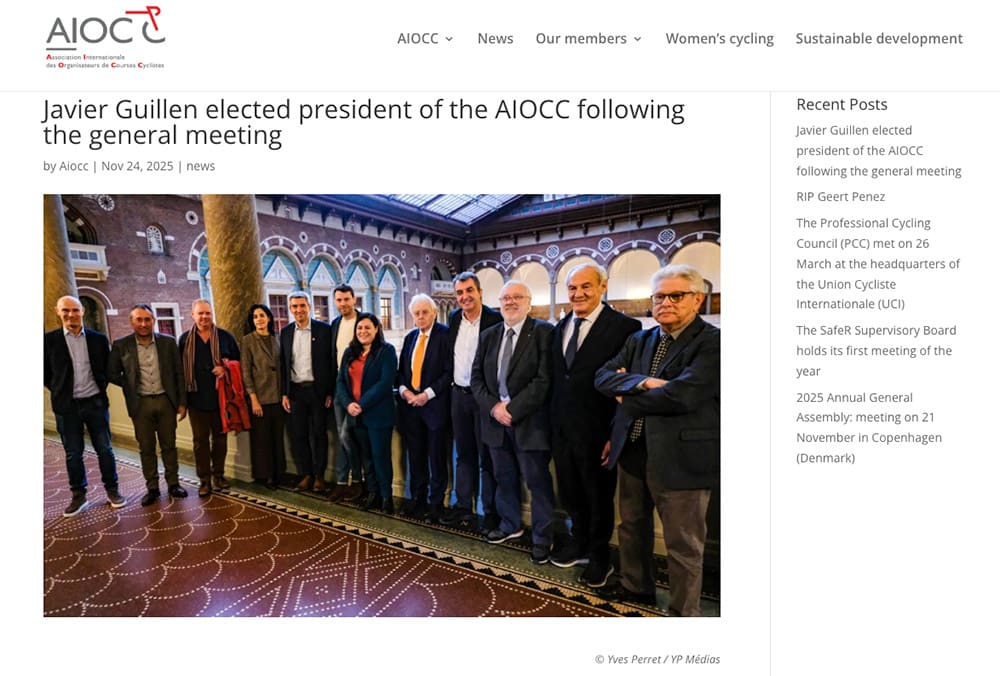
The AIOCC – the association of cycling race organizers – announced Javier Guillen as its new president last week. Guillen, head of the (ASO-owned) Vuelta took over after a fifteen-year term by (ASO-owned) Tour de France director Christian Prudhomme. This transition will probably change very little, and once again underlines the Amaury Sports Organization’s (ASO) headlock on professional cycling. Guillen immediately reinforced the status quo, saying “ it’s not about sharing the cake we have, it’s about sharing what we have to do all together to try to find new incomes.” And in a double verification effort, the majority of the other officers elected for the group were also ASO employees. (Interestingly, there is no representation on the board for RCS – the owner of the Giro.) Factually, AIOCC is now little more than a subsidiary unit of the ASO. And as any even casual observer knows, ASO has for years been accused of protecting its own control over the small sport of cycling, versus undertaking modernization or innovations to grow the size of the cake for everyone – including itself. As if to sum things up, Guillen added, “if we share what we have, nobody’s stronger.” And thus, as The Who said back in 1971 – “meet the new boss, same as the old boss.”
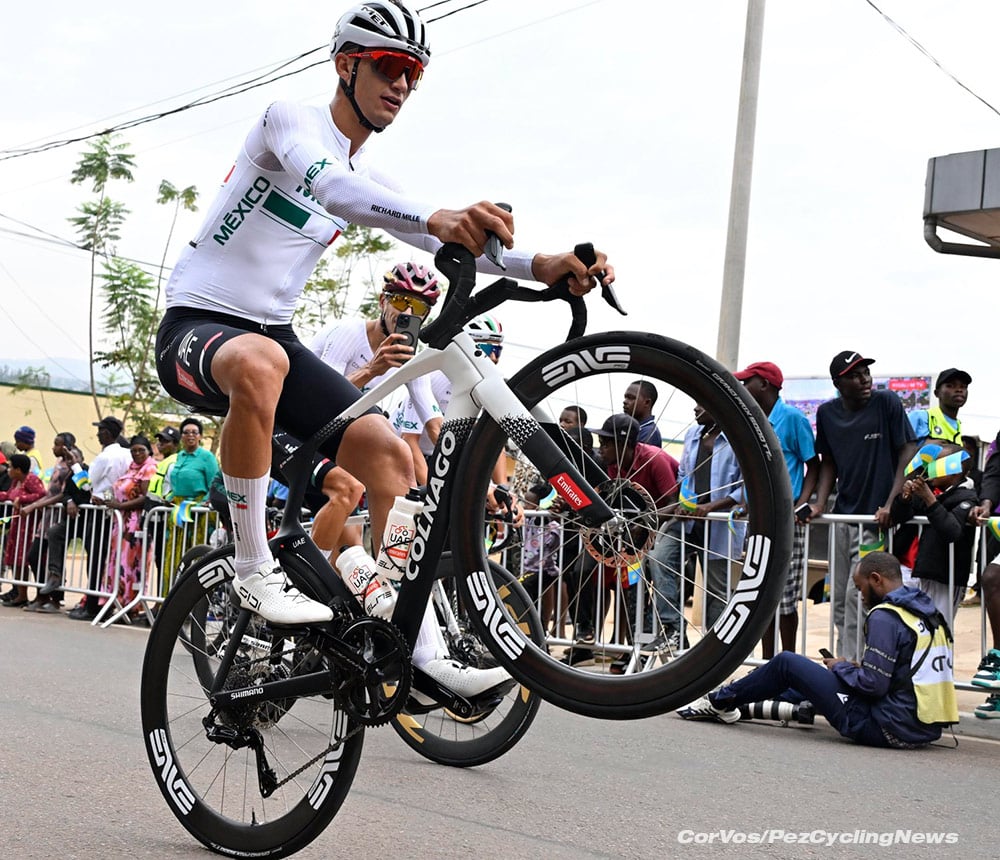 Del Toro on the way up
Del Toro on the way up
A few trends we caught onto at the end of the 2025 men’s racing season deserve a deeper look as we turn towards 2026. Which riders – outside of the top stars – most meaningfully shifted their career trajectories in 2025? A wave of genuine breakthroughs landed on the positive side of the ledger, especially Isaac del Toro joining cycling’s inner circle with 19 wins and a near-miss Giro campaign. Ben Healy translated years of promise into marquee stage victories at the Tour and Basque Country. Jay Vine transformed from super-domestique into a stealth GC threat with wins on mountain terrain and strong performances against the best in flat time trials. Rising French talent and Ineos newcomer Kévin Vauquelin delivered a Tour de France top ten and podium at Suisse despite limited resources, hence Ineos’ investment for 2026. And Germany’s Florian Lipowitz’s rapid GC ascent, capped by a Tour podium, now forces Red Bull–Bora-Hansgrohe to rethink its leadership hierarchy for the years ahead, even as it brings on highly-paid star Remco Evenepoel.
 David Gaudu – relief at the ’25 Vuelta?
David Gaudu – relief at the ’25 Vuelta?
But the modern WorldTour has become unforgiving, and a number of high-flyers slid sharply in 2025, underscoring how narrow the margins now are between contention and irrelevance. Maxim van Gils never found his footing despite a high-profile and big-money mid-contract move to Red Bull-Bora-Hansgrohe from Lotto, and now faces even stiffer competition for leadership in hilly one-day races with Evenepoel’s arrival. David Gaudu and Valentin Madouas steeply regressed and Groupama-FDJ now enters 2026 with two well-paid leaders in need of reinvention. Matej Mohorič’s lack of luck and form contributed to his multi-year slide, while Ben O’Connor’s return to mid-level GC form validated concerns about his consistency despite flashes of brilliance. Even Enric Mas, long one of the Vuelta’s most reliable podium finishers, will face internal leadership pressure in the Spanish Movistar team from Belgian Cian Uijtdebroeks, and – like many others – could be squeezed out by an influx of generational GC talent. Riders who fail to evolve – even those seemingly at the top end of the performance curve – risk getting left behind, while those who manage to level up consistently can find themselves reshaping the competitive landscape in just a few seasons. (Look for a more detailed report on these topics in our sister publication Beyond the Peloton in the near future.)
In a power-move that could reshape women’s sports, the WNBA and the league’s player’s association have restarted negotiations on a collective bargaining agreement (CBA) –and despite a proposed increase in maximum salaries, the WNBPA (the player’s association) is poised to reject the offer. And other key concessions have not yet been offered by the league in a substantial way, particularly with regards to profit sharing from the league’s media partnerships. (It’s worth noting that successful CBAs in other sports typically have revenue-sharing mechanisms of one sort or another.) Both sides are playing a dangerous gambit here; a newly proposed league called Project B that will start up in 2026 is reportedly already offering higher minimum and maximum salaries, as well as profit sharing boosts. If WNBA negotiations stall, it could open the door to a mass player exodus. One thing is always certain – as we have pointed out numerous times regarding professional women’s and men’s cyclists: true power for exerting change rests in the hands of the athletes.

